Employment Law Rights and Duties
VerifiedAdded on 2020/11/12
|12
|3882
|266
AI Summary
The provided document discusses the rights and duties in employment law. It outlines the rights that every worker has and can claim in front of a Tribunal or Court if these rights are breached by their employer. The document emphasizes that neither employee nor employer should breach the rules of employment law, and that employers must take care of their duties towards employees. It also highlights the importance of not discriminating employees on grounds such as wages, disability, etc., to maintain a proper relationship.
Contribute Materials
Your contribution can guide someone’s learning journey. Share your
documents today.
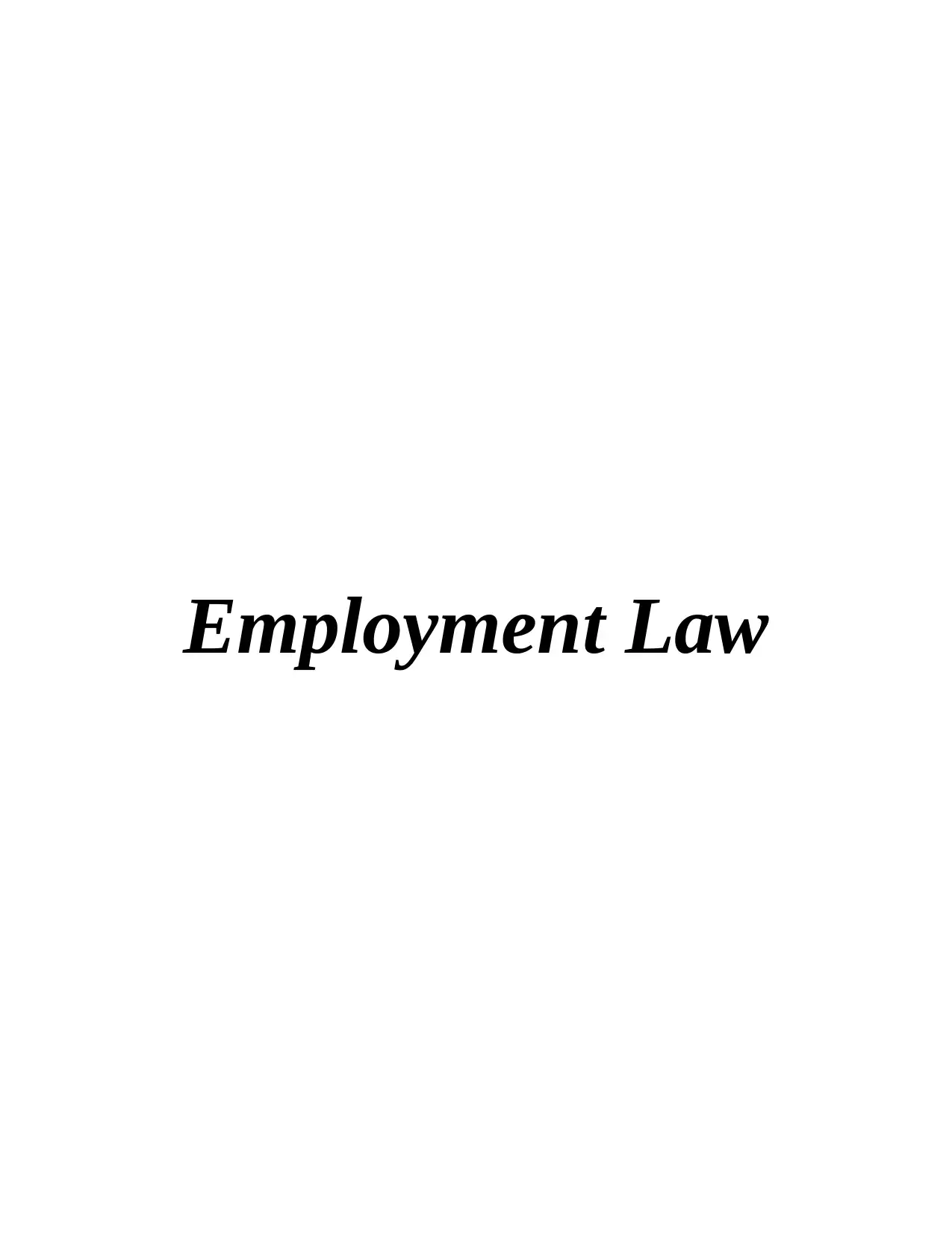
Employment Law
Secure Best Marks with AI Grader
Need help grading? Try our AI Grader for instant feedback on your assignments.
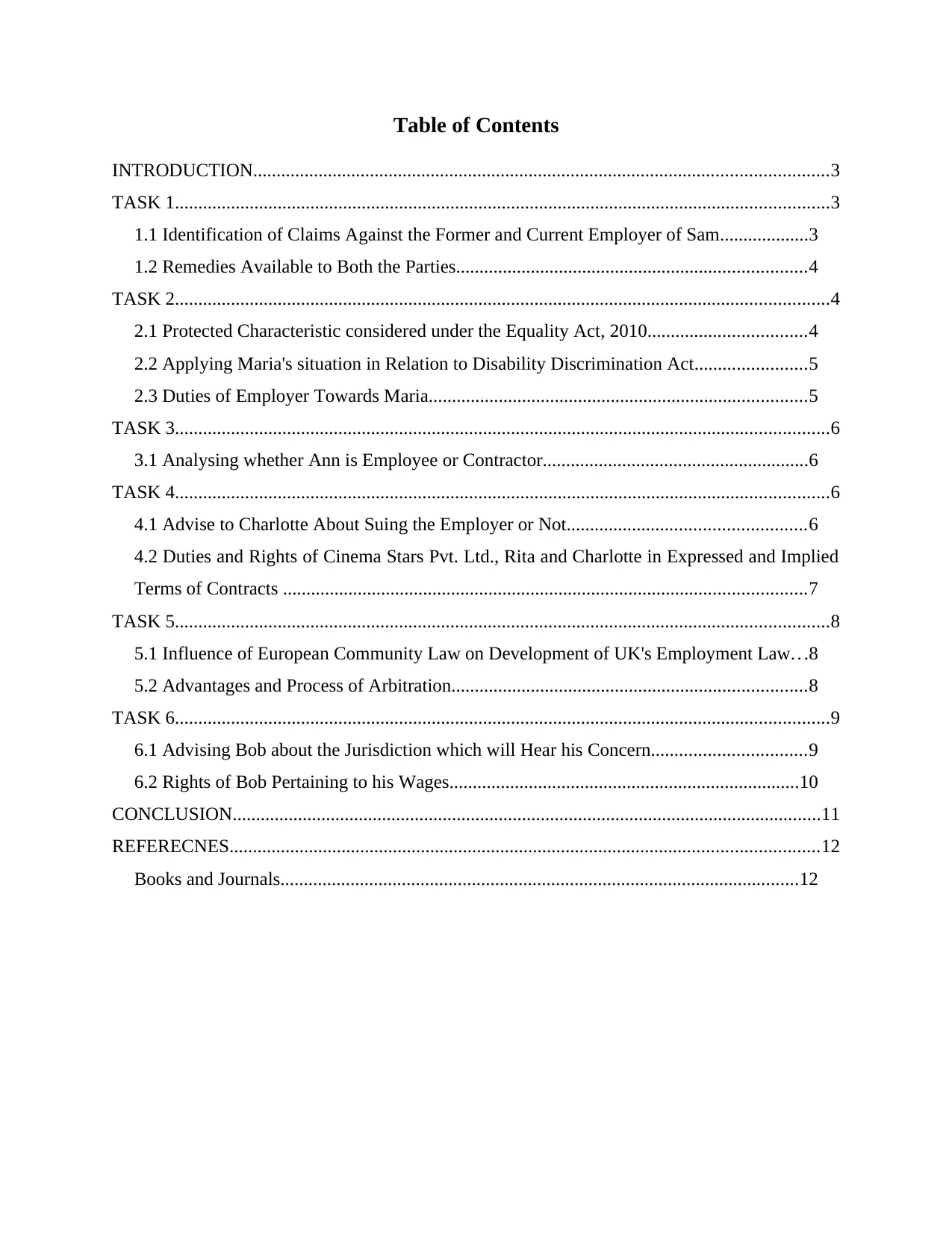
Table of Contents
INTRODUCTION...........................................................................................................................3
TASK 1............................................................................................................................................3
1.1 Identification of Claims Against the Former and Current Employer of Sam...................3
1.2 Remedies Available to Both the Parties...........................................................................4
TASK 2............................................................................................................................................4
2.1 Protected Characteristic considered under the Equality Act, 2010..................................4
2.2 Applying Maria's situation in Relation to Disability Discrimination Act........................5
2.3 Duties of Employer Towards Maria.................................................................................5
TASK 3............................................................................................................................................6
3.1 Analysing whether Ann is Employee or Contractor.........................................................6
TASK 4............................................................................................................................................6
4.1 Advise to Charlotte About Suing the Employer or Not...................................................6
4.2 Duties and Rights of Cinema Stars Pvt. Ltd., Rita and Charlotte in Expressed and Implied
Terms of Contracts ................................................................................................................7
TASK 5............................................................................................................................................8
5.1 Influence of European Community Law on Development of UK's Employment Law. . .8
5.2 Advantages and Process of Arbitration............................................................................8
TASK 6............................................................................................................................................9
6.1 Advising Bob about the Jurisdiction which will Hear his Concern.................................9
6.2 Rights of Bob Pertaining to his Wages...........................................................................10
CONCLUSION..............................................................................................................................11
REFERECNES..............................................................................................................................12
Books and Journals...............................................................................................................12
INTRODUCTION...........................................................................................................................3
TASK 1............................................................................................................................................3
1.1 Identification of Claims Against the Former and Current Employer of Sam...................3
1.2 Remedies Available to Both the Parties...........................................................................4
TASK 2............................................................................................................................................4
2.1 Protected Characteristic considered under the Equality Act, 2010..................................4
2.2 Applying Maria's situation in Relation to Disability Discrimination Act........................5
2.3 Duties of Employer Towards Maria.................................................................................5
TASK 3............................................................................................................................................6
3.1 Analysing whether Ann is Employee or Contractor.........................................................6
TASK 4............................................................................................................................................6
4.1 Advise to Charlotte About Suing the Employer or Not...................................................6
4.2 Duties and Rights of Cinema Stars Pvt. Ltd., Rita and Charlotte in Expressed and Implied
Terms of Contracts ................................................................................................................7
TASK 5............................................................................................................................................8
5.1 Influence of European Community Law on Development of UK's Employment Law. . .8
5.2 Advantages and Process of Arbitration............................................................................8
TASK 6............................................................................................................................................9
6.1 Advising Bob about the Jurisdiction which will Hear his Concern.................................9
6.2 Rights of Bob Pertaining to his Wages...........................................................................10
CONCLUSION..............................................................................................................................11
REFERECNES..............................................................................................................................12
Books and Journals...............................................................................................................12
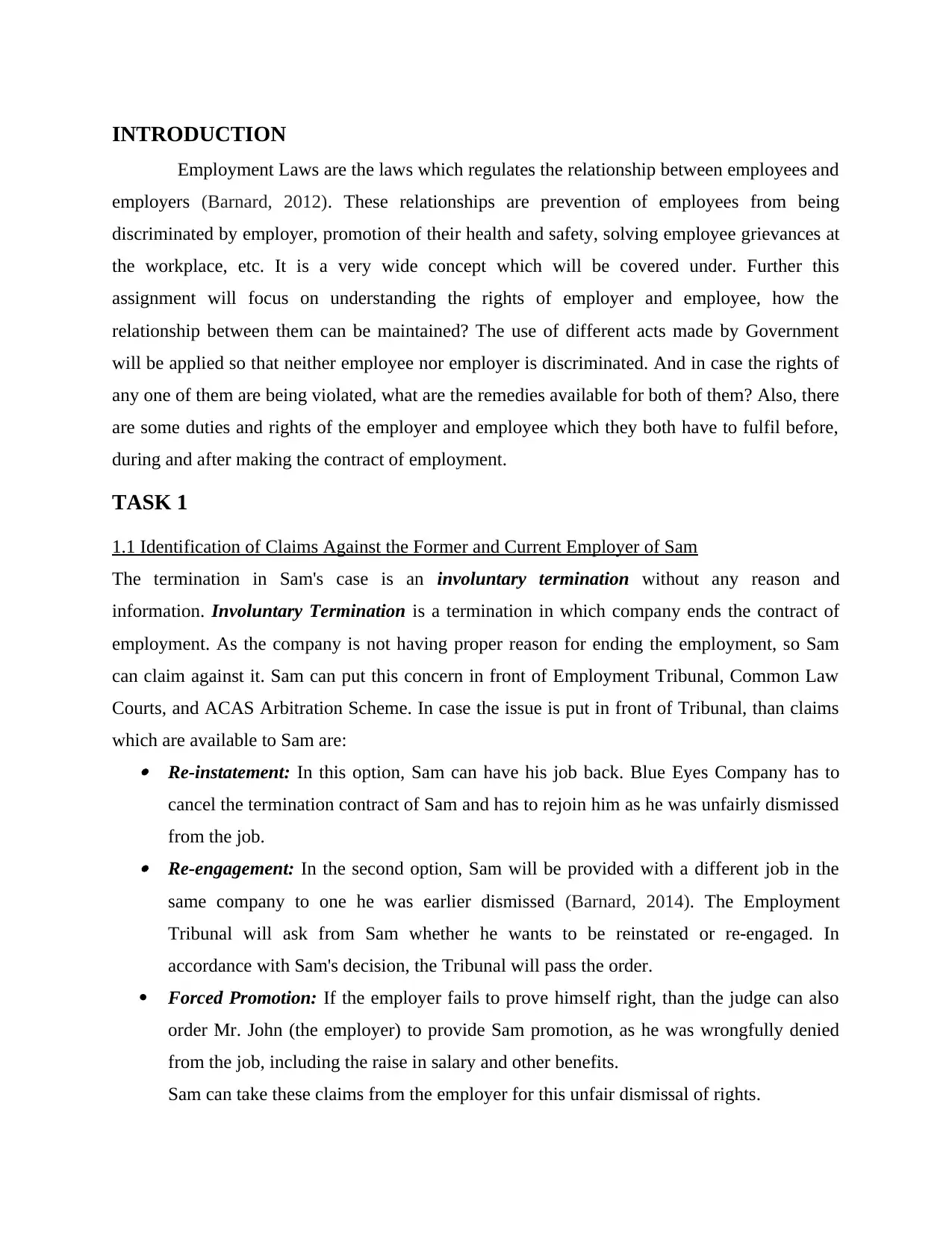
INTRODUCTION
Employment Laws are the laws which regulates the relationship between employees and
employers (Barnard, 2012). These relationships are prevention of employees from being
discriminated by employer, promotion of their health and safety, solving employee grievances at
the workplace, etc. It is a very wide concept which will be covered under. Further this
assignment will focus on understanding the rights of employer and employee, how the
relationship between them can be maintained? The use of different acts made by Government
will be applied so that neither employee nor employer is discriminated. And in case the rights of
any one of them are being violated, what are the remedies available for both of them? Also, there
are some duties and rights of the employer and employee which they both have to fulfil before,
during and after making the contract of employment.
TASK 1
1.1 Identification of Claims Against the Former and Current Employer of Sam
The termination in Sam's case is an involuntary termination without any reason and
information. Involuntary Termination is a termination in which company ends the contract of
employment. As the company is not having proper reason for ending the employment, so Sam
can claim against it. Sam can put this concern in front of Employment Tribunal, Common Law
Courts, and ACAS Arbitration Scheme. In case the issue is put in front of Tribunal, than claims
which are available to Sam are: Re-instatement: In this option, Sam can have his job back. Blue Eyes Company has to
cancel the termination contract of Sam and has to rejoin him as he was unfairly dismissed
from the job. Re-engagement: In the second option, Sam will be provided with a different job in the
same company to one he was earlier dismissed (Barnard, 2014). The Employment
Tribunal will ask from Sam whether he wants to be reinstated or re-engaged. In
accordance with Sam's decision, the Tribunal will pass the order.
Forced Promotion: If the employer fails to prove himself right, than the judge can also
order Mr. John (the employer) to provide Sam promotion, as he was wrongfully denied
from the job, including the raise in salary and other benefits.
Sam can take these claims from the employer for this unfair dismissal of rights.
Employment Laws are the laws which regulates the relationship between employees and
employers (Barnard, 2012). These relationships are prevention of employees from being
discriminated by employer, promotion of their health and safety, solving employee grievances at
the workplace, etc. It is a very wide concept which will be covered under. Further this
assignment will focus on understanding the rights of employer and employee, how the
relationship between them can be maintained? The use of different acts made by Government
will be applied so that neither employee nor employer is discriminated. And in case the rights of
any one of them are being violated, what are the remedies available for both of them? Also, there
are some duties and rights of the employer and employee which they both have to fulfil before,
during and after making the contract of employment.
TASK 1
1.1 Identification of Claims Against the Former and Current Employer of Sam
The termination in Sam's case is an involuntary termination without any reason and
information. Involuntary Termination is a termination in which company ends the contract of
employment. As the company is not having proper reason for ending the employment, so Sam
can claim against it. Sam can put this concern in front of Employment Tribunal, Common Law
Courts, and ACAS Arbitration Scheme. In case the issue is put in front of Tribunal, than claims
which are available to Sam are: Re-instatement: In this option, Sam can have his job back. Blue Eyes Company has to
cancel the termination contract of Sam and has to rejoin him as he was unfairly dismissed
from the job. Re-engagement: In the second option, Sam will be provided with a different job in the
same company to one he was earlier dismissed (Barnard, 2014). The Employment
Tribunal will ask from Sam whether he wants to be reinstated or re-engaged. In
accordance with Sam's decision, the Tribunal will pass the order.
Forced Promotion: If the employer fails to prove himself right, than the judge can also
order Mr. John (the employer) to provide Sam promotion, as he was wrongfully denied
from the job, including the raise in salary and other benefits.
Sam can take these claims from the employer for this unfair dismissal of rights.
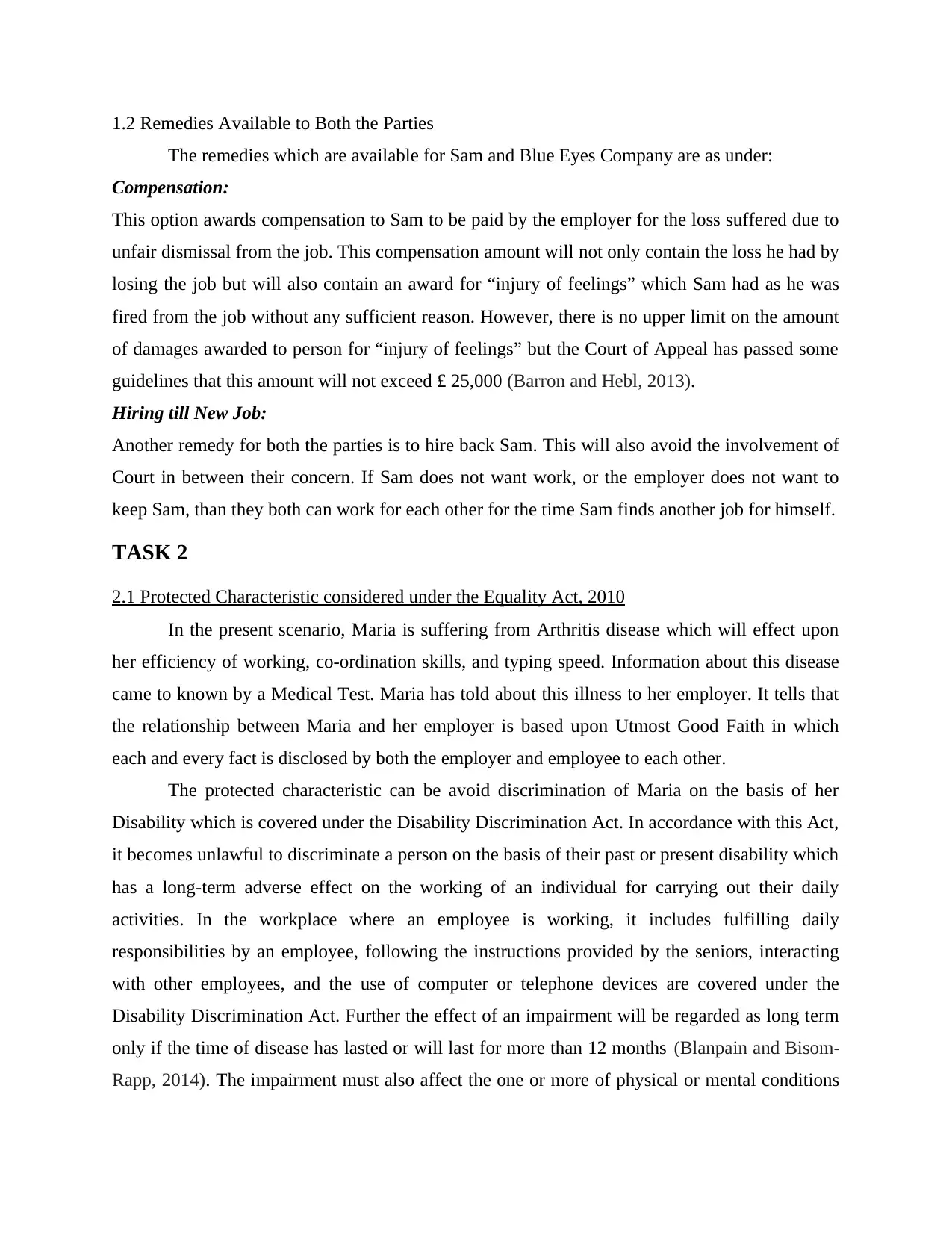
1.2 Remedies Available to Both the Parties
The remedies which are available for Sam and Blue Eyes Company are as under:
Compensation:
This option awards compensation to Sam to be paid by the employer for the loss suffered due to
unfair dismissal from the job. This compensation amount will not only contain the loss he had by
losing the job but will also contain an award for “injury of feelings” which Sam had as he was
fired from the job without any sufficient reason. However, there is no upper limit on the amount
of damages awarded to person for “injury of feelings” but the Court of Appeal has passed some
guidelines that this amount will not exceed £ 25,000 (Barron and Hebl, 2013).
Hiring till New Job:
Another remedy for both the parties is to hire back Sam. This will also avoid the involvement of
Court in between their concern. If Sam does not want work, or the employer does not want to
keep Sam, than they both can work for each other for the time Sam finds another job for himself.
TASK 2
2.1 Protected Characteristic considered under the Equality Act, 2010
In the present scenario, Maria is suffering from Arthritis disease which will effect upon
her efficiency of working, co-ordination skills, and typing speed. Information about this disease
came to known by a Medical Test. Maria has told about this illness to her employer. It tells that
the relationship between Maria and her employer is based upon Utmost Good Faith in which
each and every fact is disclosed by both the employer and employee to each other.
The protected characteristic can be avoid discrimination of Maria on the basis of her
Disability which is covered under the Disability Discrimination Act. In accordance with this Act,
it becomes unlawful to discriminate a person on the basis of their past or present disability which
has a long-term adverse effect on the working of an individual for carrying out their daily
activities. In the workplace where an employee is working, it includes fulfilling daily
responsibilities by an employee, following the instructions provided by the seniors, interacting
with other employees, and the use of computer or telephone devices are covered under the
Disability Discrimination Act. Further the effect of an impairment will be regarded as long term
only if the time of disease has lasted or will last for more than 12 months (Blanpain and Bisom-
Rapp, 2014). The impairment must also affect the one or more of physical or mental conditions
The remedies which are available for Sam and Blue Eyes Company are as under:
Compensation:
This option awards compensation to Sam to be paid by the employer for the loss suffered due to
unfair dismissal from the job. This compensation amount will not only contain the loss he had by
losing the job but will also contain an award for “injury of feelings” which Sam had as he was
fired from the job without any sufficient reason. However, there is no upper limit on the amount
of damages awarded to person for “injury of feelings” but the Court of Appeal has passed some
guidelines that this amount will not exceed £ 25,000 (Barron and Hebl, 2013).
Hiring till New Job:
Another remedy for both the parties is to hire back Sam. This will also avoid the involvement of
Court in between their concern. If Sam does not want work, or the employer does not want to
keep Sam, than they both can work for each other for the time Sam finds another job for himself.
TASK 2
2.1 Protected Characteristic considered under the Equality Act, 2010
In the present scenario, Maria is suffering from Arthritis disease which will effect upon
her efficiency of working, co-ordination skills, and typing speed. Information about this disease
came to known by a Medical Test. Maria has told about this illness to her employer. It tells that
the relationship between Maria and her employer is based upon Utmost Good Faith in which
each and every fact is disclosed by both the employer and employee to each other.
The protected characteristic can be avoid discrimination of Maria on the basis of her
Disability which is covered under the Disability Discrimination Act. In accordance with this Act,
it becomes unlawful to discriminate a person on the basis of their past or present disability which
has a long-term adverse effect on the working of an individual for carrying out their daily
activities. In the workplace where an employee is working, it includes fulfilling daily
responsibilities by an employee, following the instructions provided by the seniors, interacting
with other employees, and the use of computer or telephone devices are covered under the
Disability Discrimination Act. Further the effect of an impairment will be regarded as long term
only if the time of disease has lasted or will last for more than 12 months (Blanpain and Bisom-
Rapp, 2014). The impairment must also affect the one or more of physical or mental conditions
Secure Best Marks with AI Grader
Need help grading? Try our AI Grader for instant feedback on your assignments.
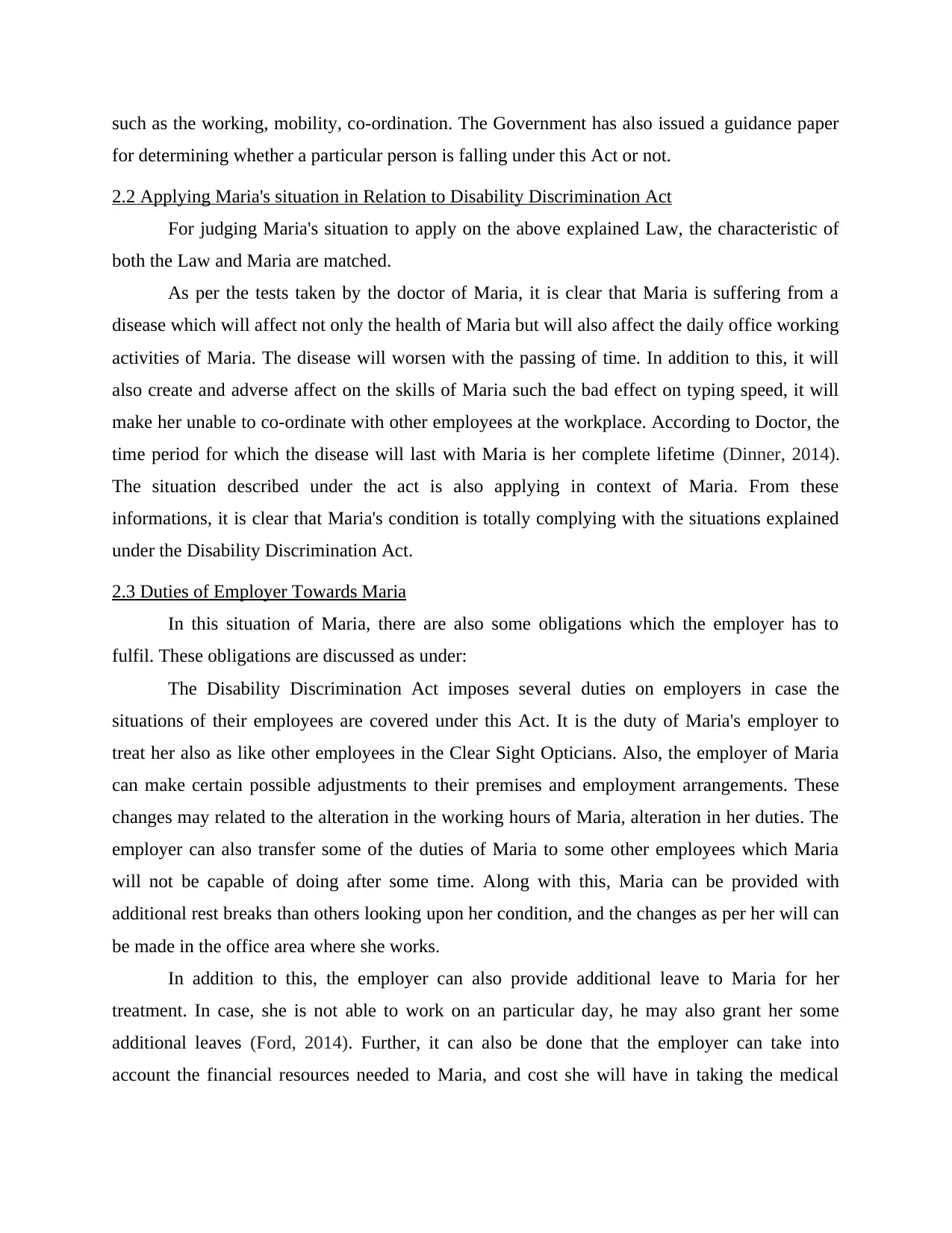
such as the working, mobility, co-ordination. The Government has also issued a guidance paper
for determining whether a particular person is falling under this Act or not.
2.2 Applying Maria's situation in Relation to Disability Discrimination Act
For judging Maria's situation to apply on the above explained Law, the characteristic of
both the Law and Maria are matched.
As per the tests taken by the doctor of Maria, it is clear that Maria is suffering from a
disease which will affect not only the health of Maria but will also affect the daily office working
activities of Maria. The disease will worsen with the passing of time. In addition to this, it will
also create and adverse affect on the skills of Maria such the bad effect on typing speed, it will
make her unable to co-ordinate with other employees at the workplace. According to Doctor, the
time period for which the disease will last with Maria is her complete lifetime (Dinner, 2014).
The situation described under the act is also applying in context of Maria. From these
informations, it is clear that Maria's condition is totally complying with the situations explained
under the Disability Discrimination Act.
2.3 Duties of Employer Towards Maria
In this situation of Maria, there are also some obligations which the employer has to
fulfil. These obligations are discussed as under:
The Disability Discrimination Act imposes several duties on employers in case the
situations of their employees are covered under this Act. It is the duty of Maria's employer to
treat her also as like other employees in the Clear Sight Opticians. Also, the employer of Maria
can make certain possible adjustments to their premises and employment arrangements. These
changes may related to the alteration in the working hours of Maria, alteration in her duties. The
employer can also transfer some of the duties of Maria to some other employees which Maria
will not be capable of doing after some time. Along with this, Maria can be provided with
additional rest breaks than others looking upon her condition, and the changes as per her will can
be made in the office area where she works.
In addition to this, the employer can also provide additional leave to Maria for her
treatment. In case, she is not able to work on an particular day, he may also grant her some
additional leaves (Ford, 2014). Further, it can also be done that the employer can take into
account the financial resources needed to Maria, and cost she will have in taking the medical
for determining whether a particular person is falling under this Act or not.
2.2 Applying Maria's situation in Relation to Disability Discrimination Act
For judging Maria's situation to apply on the above explained Law, the characteristic of
both the Law and Maria are matched.
As per the tests taken by the doctor of Maria, it is clear that Maria is suffering from a
disease which will affect not only the health of Maria but will also affect the daily office working
activities of Maria. The disease will worsen with the passing of time. In addition to this, it will
also create and adverse affect on the skills of Maria such the bad effect on typing speed, it will
make her unable to co-ordinate with other employees at the workplace. According to Doctor, the
time period for which the disease will last with Maria is her complete lifetime (Dinner, 2014).
The situation described under the act is also applying in context of Maria. From these
informations, it is clear that Maria's condition is totally complying with the situations explained
under the Disability Discrimination Act.
2.3 Duties of Employer Towards Maria
In this situation of Maria, there are also some obligations which the employer has to
fulfil. These obligations are discussed as under:
The Disability Discrimination Act imposes several duties on employers in case the
situations of their employees are covered under this Act. It is the duty of Maria's employer to
treat her also as like other employees in the Clear Sight Opticians. Also, the employer of Maria
can make certain possible adjustments to their premises and employment arrangements. These
changes may related to the alteration in the working hours of Maria, alteration in her duties. The
employer can also transfer some of the duties of Maria to some other employees which Maria
will not be capable of doing after some time. Along with this, Maria can be provided with
additional rest breaks than others looking upon her condition, and the changes as per her will can
be made in the office area where she works.
In addition to this, the employer can also provide additional leave to Maria for her
treatment. In case, she is not able to work on an particular day, he may also grant her some
additional leaves (Ford, 2014). Further, it can also be done that the employer can take into
account the financial resources needed to Maria, and cost she will have in taking the medical
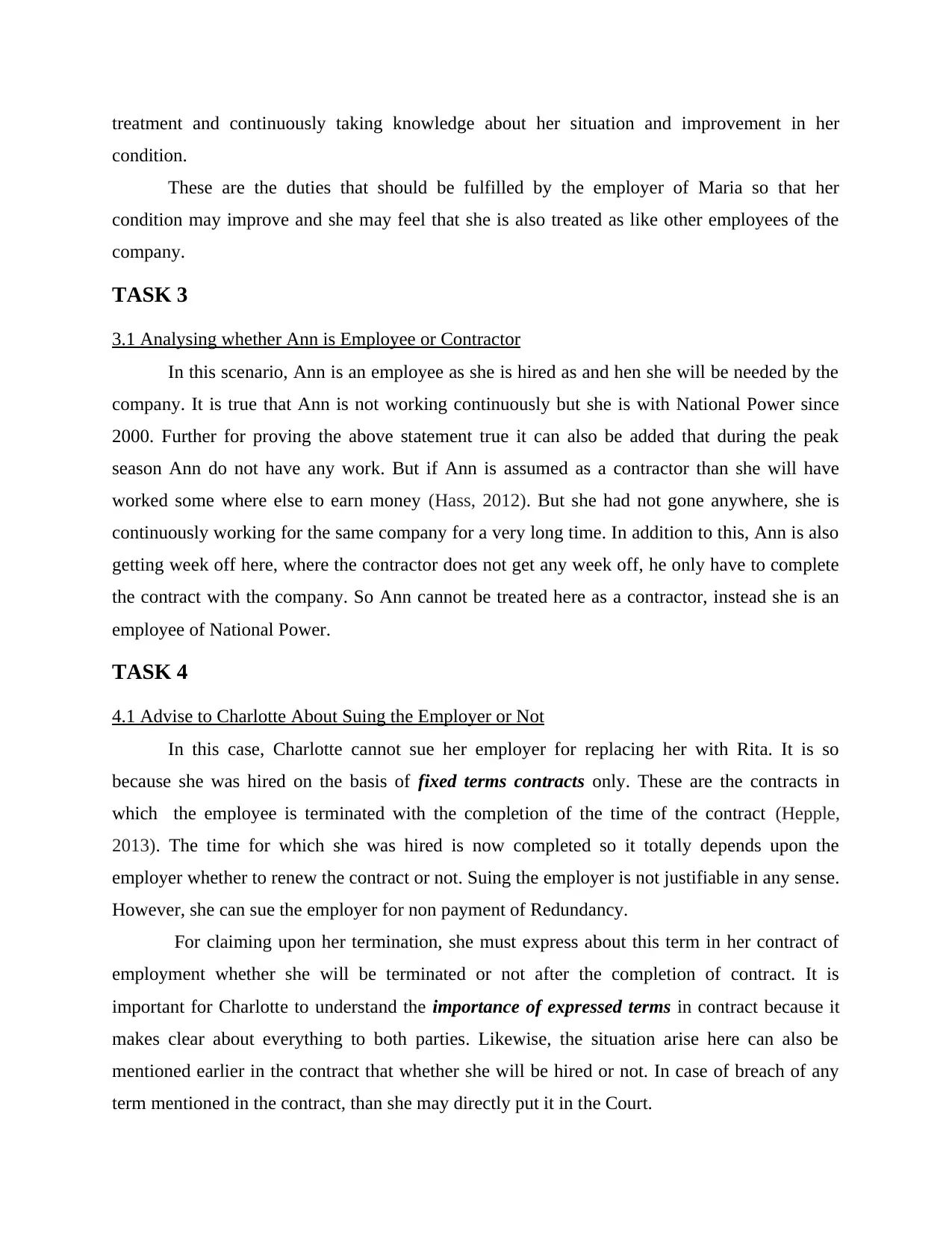
treatment and continuously taking knowledge about her situation and improvement in her
condition.
These are the duties that should be fulfilled by the employer of Maria so that her
condition may improve and she may feel that she is also treated as like other employees of the
company.
TASK 3
3.1 Analysing whether Ann is Employee or Contractor
In this scenario, Ann is an employee as she is hired as and hen she will be needed by the
company. It is true that Ann is not working continuously but she is with National Power since
2000. Further for proving the above statement true it can also be added that during the peak
season Ann do not have any work. But if Ann is assumed as a contractor than she will have
worked some where else to earn money (Hass, 2012). But she had not gone anywhere, she is
continuously working for the same company for a very long time. In addition to this, Ann is also
getting week off here, where the contractor does not get any week off, he only have to complete
the contract with the company. So Ann cannot be treated here as a contractor, instead she is an
employee of National Power.
TASK 4
4.1 Advise to Charlotte About Suing the Employer or Not
In this case, Charlotte cannot sue her employer for replacing her with Rita. It is so
because she was hired on the basis of fixed terms contracts only. These are the contracts in
which the employee is terminated with the completion of the time of the contract (Hepple,
2013). The time for which she was hired is now completed so it totally depends upon the
employer whether to renew the contract or not. Suing the employer is not justifiable in any sense.
However, she can sue the employer for non payment of Redundancy.
For claiming upon her termination, she must express about this term in her contract of
employment whether she will be terminated or not after the completion of contract. It is
important for Charlotte to understand the importance of expressed terms in contract because it
makes clear about everything to both parties. Likewise, the situation arise here can also be
mentioned earlier in the contract that whether she will be hired or not. In case of breach of any
term mentioned in the contract, than she may directly put it in the Court.
condition.
These are the duties that should be fulfilled by the employer of Maria so that her
condition may improve and she may feel that she is also treated as like other employees of the
company.
TASK 3
3.1 Analysing whether Ann is Employee or Contractor
In this scenario, Ann is an employee as she is hired as and hen she will be needed by the
company. It is true that Ann is not working continuously but she is with National Power since
2000. Further for proving the above statement true it can also be added that during the peak
season Ann do not have any work. But if Ann is assumed as a contractor than she will have
worked some where else to earn money (Hass, 2012). But she had not gone anywhere, she is
continuously working for the same company for a very long time. In addition to this, Ann is also
getting week off here, where the contractor does not get any week off, he only have to complete
the contract with the company. So Ann cannot be treated here as a contractor, instead she is an
employee of National Power.
TASK 4
4.1 Advise to Charlotte About Suing the Employer or Not
In this case, Charlotte cannot sue her employer for replacing her with Rita. It is so
because she was hired on the basis of fixed terms contracts only. These are the contracts in
which the employee is terminated with the completion of the time of the contract (Hepple,
2013). The time for which she was hired is now completed so it totally depends upon the
employer whether to renew the contract or not. Suing the employer is not justifiable in any sense.
However, she can sue the employer for non payment of Redundancy.
For claiming upon her termination, she must express about this term in her contract of
employment whether she will be terminated or not after the completion of contract. It is
important for Charlotte to understand the importance of expressed terms in contract because it
makes clear about everything to both parties. Likewise, the situation arise here can also be
mentioned earlier in the contract that whether she will be hired or not. In case of breach of any
term mentioned in the contract, than she may directly put it in the Court.
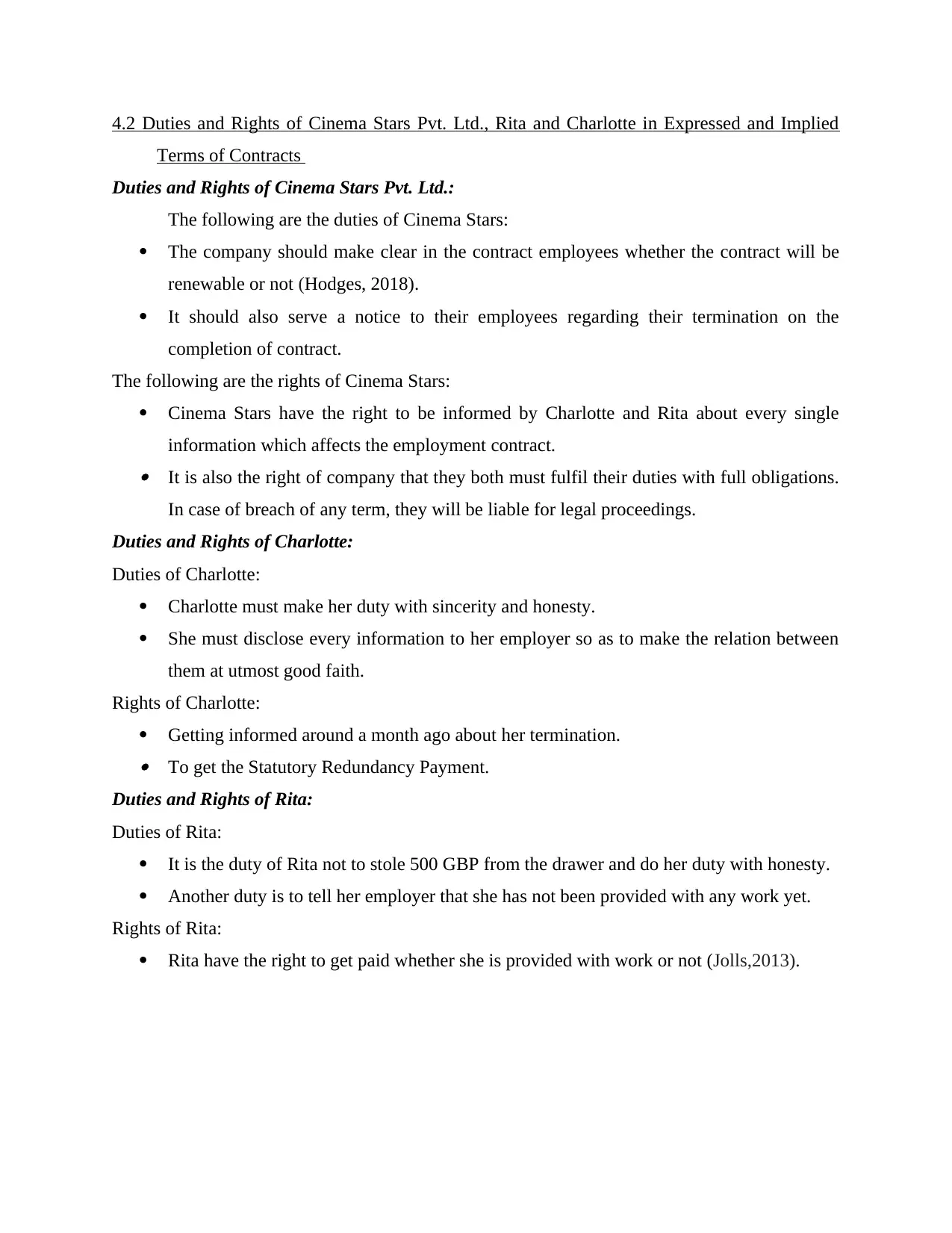
4.2 Duties and Rights of Cinema Stars Pvt. Ltd., Rita and Charlotte in Expressed and Implied
Terms of Contracts
Duties and Rights of Cinema Stars Pvt. Ltd.:
The following are the duties of Cinema Stars:
The company should make clear in the contract employees whether the contract will be
renewable or not (Hodges, 2018).
It should also serve a notice to their employees regarding their termination on the
completion of contract.
The following are the rights of Cinema Stars:
Cinema Stars have the right to be informed by Charlotte and Rita about every single
information which affects the employment contract. It is also the right of company that they both must fulfil their duties with full obligations.
In case of breach of any term, they will be liable for legal proceedings.
Duties and Rights of Charlotte:
Duties of Charlotte:
Charlotte must make her duty with sincerity and honesty.
She must disclose every information to her employer so as to make the relation between
them at utmost good faith.
Rights of Charlotte:
Getting informed around a month ago about her termination. To get the Statutory Redundancy Payment.
Duties and Rights of Rita:
Duties of Rita:
It is the duty of Rita not to stole 500 GBP from the drawer and do her duty with honesty.
Another duty is to tell her employer that she has not been provided with any work yet.
Rights of Rita:
Rita have the right to get paid whether she is provided with work or not (Jolls,2013).
Terms of Contracts
Duties and Rights of Cinema Stars Pvt. Ltd.:
The following are the duties of Cinema Stars:
The company should make clear in the contract employees whether the contract will be
renewable or not (Hodges, 2018).
It should also serve a notice to their employees regarding their termination on the
completion of contract.
The following are the rights of Cinema Stars:
Cinema Stars have the right to be informed by Charlotte and Rita about every single
information which affects the employment contract. It is also the right of company that they both must fulfil their duties with full obligations.
In case of breach of any term, they will be liable for legal proceedings.
Duties and Rights of Charlotte:
Duties of Charlotte:
Charlotte must make her duty with sincerity and honesty.
She must disclose every information to her employer so as to make the relation between
them at utmost good faith.
Rights of Charlotte:
Getting informed around a month ago about her termination. To get the Statutory Redundancy Payment.
Duties and Rights of Rita:
Duties of Rita:
It is the duty of Rita not to stole 500 GBP from the drawer and do her duty with honesty.
Another duty is to tell her employer that she has not been provided with any work yet.
Rights of Rita:
Rita have the right to get paid whether she is provided with work or not (Jolls,2013).
Paraphrase This Document
Need a fresh take? Get an instant paraphrase of this document with our AI Paraphraser
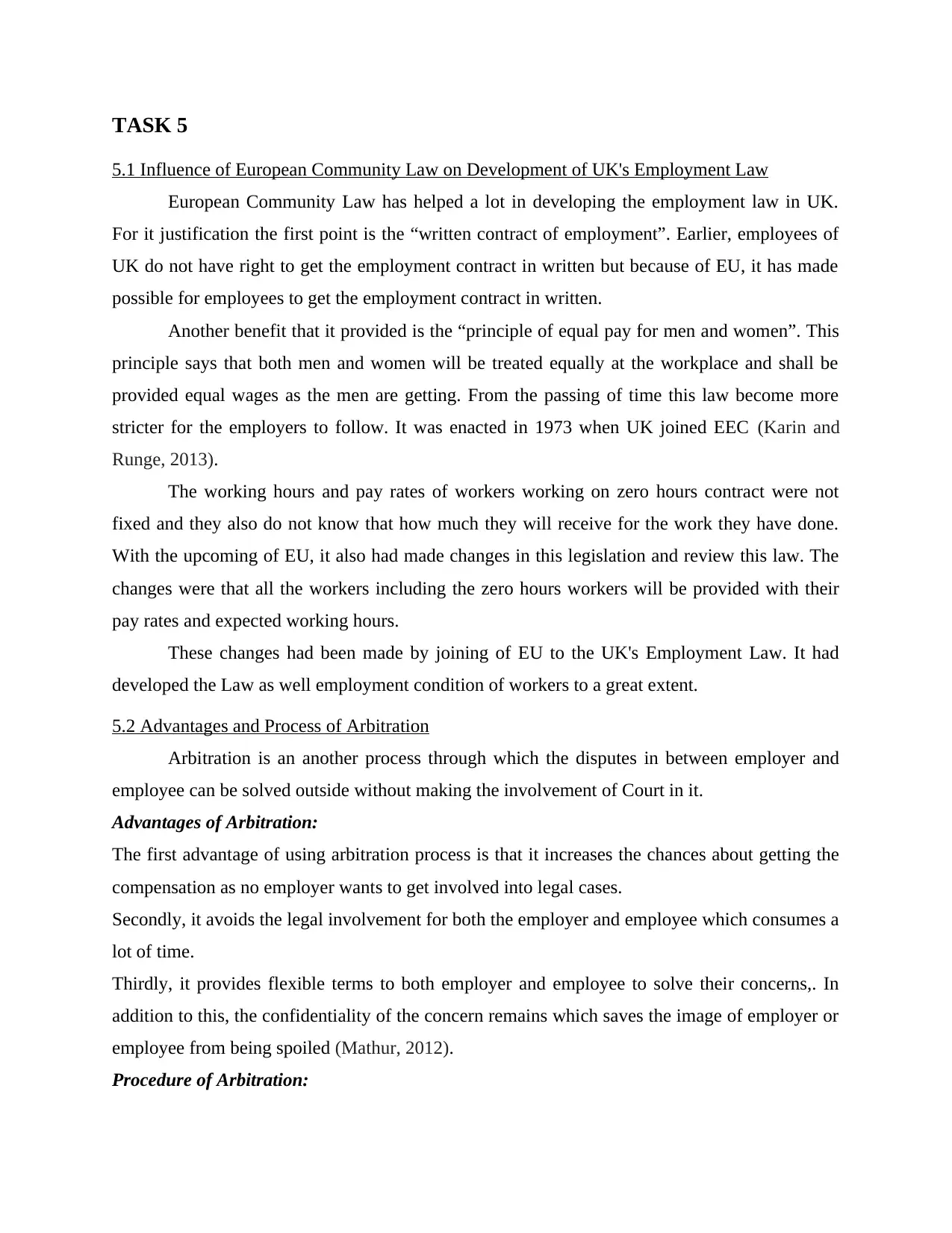
TASK 5
5.1 Influence of European Community Law on Development of UK's Employment Law
European Community Law has helped a lot in developing the employment law in UK.
For it justification the first point is the “written contract of employment”. Earlier, employees of
UK do not have right to get the employment contract in written but because of EU, it has made
possible for employees to get the employment contract in written.
Another benefit that it provided is the “principle of equal pay for men and women”. This
principle says that both men and women will be treated equally at the workplace and shall be
provided equal wages as the men are getting. From the passing of time this law become more
stricter for the employers to follow. It was enacted in 1973 when UK joined EEC (Karin and
Runge, 2013).
The working hours and pay rates of workers working on zero hours contract were not
fixed and they also do not know that how much they will receive for the work they have done.
With the upcoming of EU, it also had made changes in this legislation and review this law. The
changes were that all the workers including the zero hours workers will be provided with their
pay rates and expected working hours.
These changes had been made by joining of EU to the UK's Employment Law. It had
developed the Law as well employment condition of workers to a great extent.
5.2 Advantages and Process of Arbitration
Arbitration is an another process through which the disputes in between employer and
employee can be solved outside without making the involvement of Court in it.
Advantages of Arbitration:
The first advantage of using arbitration process is that it increases the chances about getting the
compensation as no employer wants to get involved into legal cases.
Secondly, it avoids the legal involvement for both the employer and employee which consumes a
lot of time.
Thirdly, it provides flexible terms to both employer and employee to solve their concerns,. In
addition to this, the confidentiality of the concern remains which saves the image of employer or
employee from being spoiled (Mathur, 2012).
Procedure of Arbitration:
5.1 Influence of European Community Law on Development of UK's Employment Law
European Community Law has helped a lot in developing the employment law in UK.
For it justification the first point is the “written contract of employment”. Earlier, employees of
UK do not have right to get the employment contract in written but because of EU, it has made
possible for employees to get the employment contract in written.
Another benefit that it provided is the “principle of equal pay for men and women”. This
principle says that both men and women will be treated equally at the workplace and shall be
provided equal wages as the men are getting. From the passing of time this law become more
stricter for the employers to follow. It was enacted in 1973 when UK joined EEC (Karin and
Runge, 2013).
The working hours and pay rates of workers working on zero hours contract were not
fixed and they also do not know that how much they will receive for the work they have done.
With the upcoming of EU, it also had made changes in this legislation and review this law. The
changes were that all the workers including the zero hours workers will be provided with their
pay rates and expected working hours.
These changes had been made by joining of EU to the UK's Employment Law. It had
developed the Law as well employment condition of workers to a great extent.
5.2 Advantages and Process of Arbitration
Arbitration is an another process through which the disputes in between employer and
employee can be solved outside without making the involvement of Court in it.
Advantages of Arbitration:
The first advantage of using arbitration process is that it increases the chances about getting the
compensation as no employer wants to get involved into legal cases.
Secondly, it avoids the legal involvement for both the employer and employee which consumes a
lot of time.
Thirdly, it provides flexible terms to both employer and employee to solve their concerns,. In
addition to this, the confidentiality of the concern remains which saves the image of employer or
employee from being spoiled (Mathur, 2012).
Procedure of Arbitration:
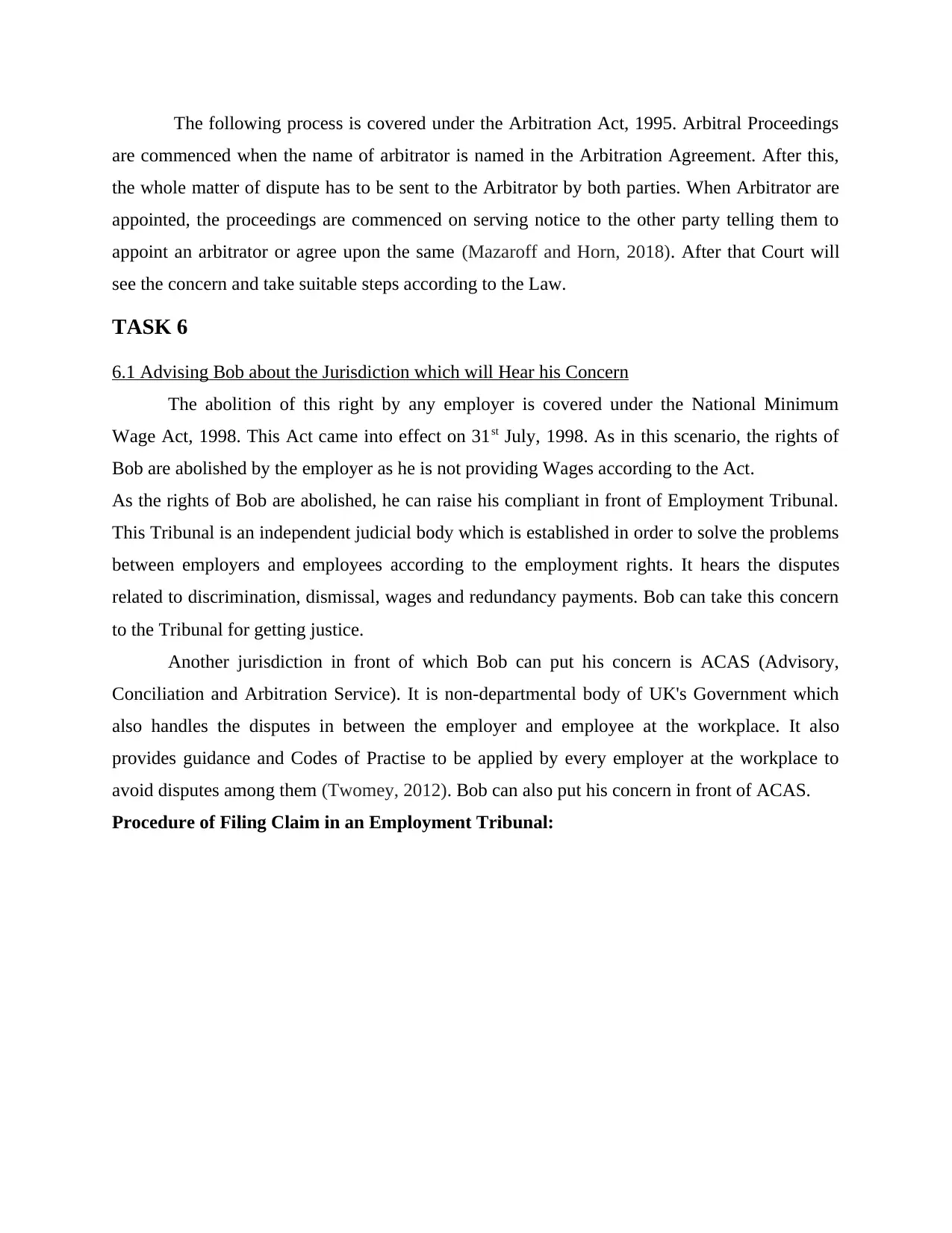
The following process is covered under the Arbitration Act, 1995. Arbitral Proceedings
are commenced when the name of arbitrator is named in the Arbitration Agreement. After this,
the whole matter of dispute has to be sent to the Arbitrator by both parties. When Arbitrator are
appointed, the proceedings are commenced on serving notice to the other party telling them to
appoint an arbitrator or agree upon the same (Mazaroff and Horn, 2018). After that Court will
see the concern and take suitable steps according to the Law.
TASK 6
6.1 Advising Bob about the Jurisdiction which will Hear his Concern
The abolition of this right by any employer is covered under the National Minimum
Wage Act, 1998. This Act came into effect on 31st July, 1998. As in this scenario, the rights of
Bob are abolished by the employer as he is not providing Wages according to the Act.
As the rights of Bob are abolished, he can raise his compliant in front of Employment Tribunal.
This Tribunal is an independent judicial body which is established in order to solve the problems
between employers and employees according to the employment rights. It hears the disputes
related to discrimination, dismissal, wages and redundancy payments. Bob can take this concern
to the Tribunal for getting justice.
Another jurisdiction in front of which Bob can put his concern is ACAS (Advisory,
Conciliation and Arbitration Service). It is non-departmental body of UK's Government which
also handles the disputes in between the employer and employee at the workplace. It also
provides guidance and Codes of Practise to be applied by every employer at the workplace to
avoid disputes among them (Twomey, 2012). Bob can also put his concern in front of ACAS.
Procedure of Filing Claim in an Employment Tribunal:
are commenced when the name of arbitrator is named in the Arbitration Agreement. After this,
the whole matter of dispute has to be sent to the Arbitrator by both parties. When Arbitrator are
appointed, the proceedings are commenced on serving notice to the other party telling them to
appoint an arbitrator or agree upon the same (Mazaroff and Horn, 2018). After that Court will
see the concern and take suitable steps according to the Law.
TASK 6
6.1 Advising Bob about the Jurisdiction which will Hear his Concern
The abolition of this right by any employer is covered under the National Minimum
Wage Act, 1998. This Act came into effect on 31st July, 1998. As in this scenario, the rights of
Bob are abolished by the employer as he is not providing Wages according to the Act.
As the rights of Bob are abolished, he can raise his compliant in front of Employment Tribunal.
This Tribunal is an independent judicial body which is established in order to solve the problems
between employers and employees according to the employment rights. It hears the disputes
related to discrimination, dismissal, wages and redundancy payments. Bob can take this concern
to the Tribunal for getting justice.
Another jurisdiction in front of which Bob can put his concern is ACAS (Advisory,
Conciliation and Arbitration Service). It is non-departmental body of UK's Government which
also handles the disputes in between the employer and employee at the workplace. It also
provides guidance and Codes of Practise to be applied by every employer at the workplace to
avoid disputes among them (Twomey, 2012). Bob can also put his concern in front of ACAS.
Procedure of Filing Claim in an Employment Tribunal:
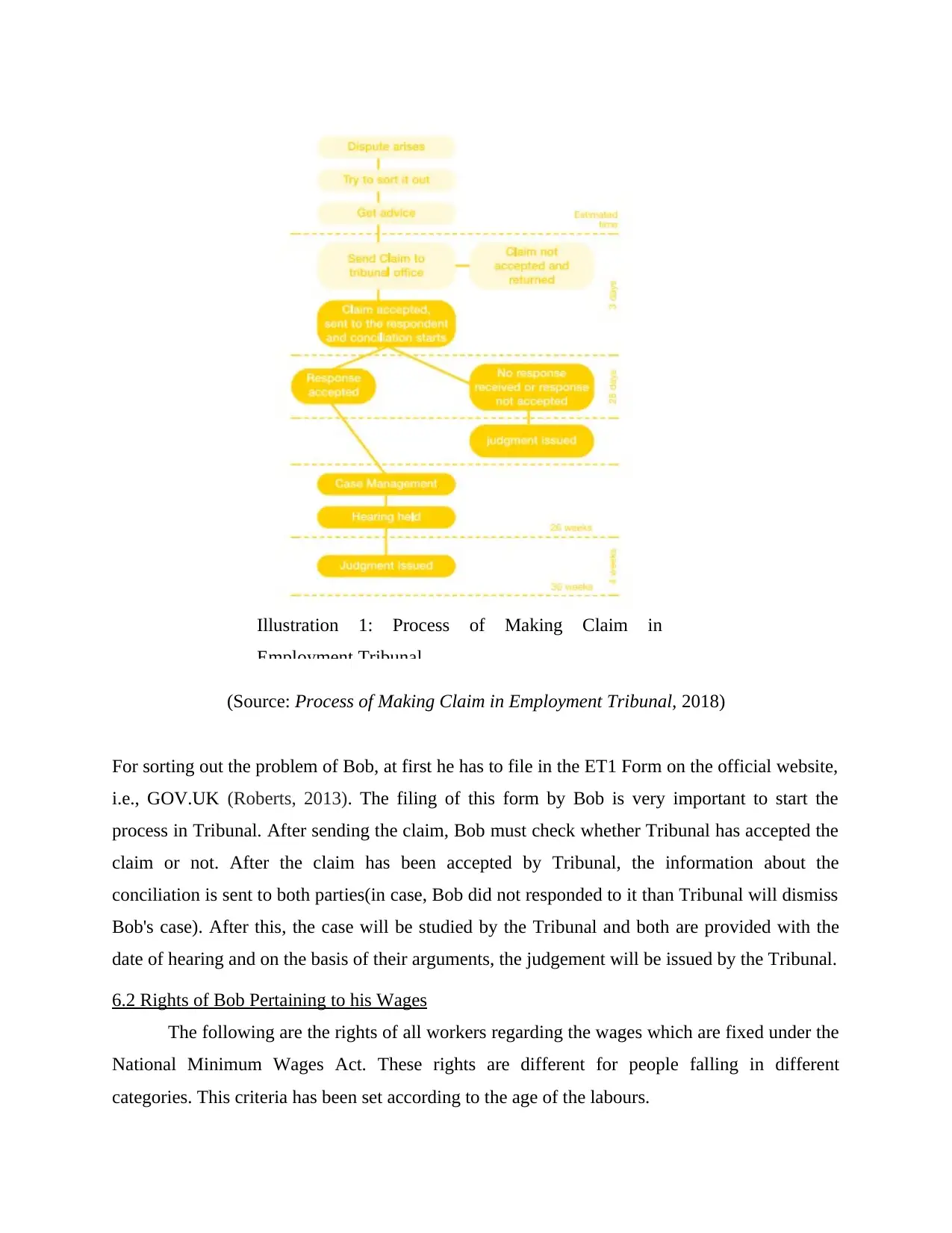
(Source: Process of Making Claim in Employment Tribunal, 2018)
For sorting out the problem of Bob, at first he has to file in the ET1 Form on the official website,
i.e., GOV.UK (Roberts, 2013). The filing of this form by Bob is very important to start the
process in Tribunal. After sending the claim, Bob must check whether Tribunal has accepted the
claim or not. After the claim has been accepted by Tribunal, the information about the
conciliation is sent to both parties(in case, Bob did not responded to it than Tribunal will dismiss
Bob's case). After this, the case will be studied by the Tribunal and both are provided with the
date of hearing and on the basis of their arguments, the judgement will be issued by the Tribunal.
6.2 Rights of Bob Pertaining to his Wages
The following are the rights of all workers regarding the wages which are fixed under the
National Minimum Wages Act. These rights are different for people falling in different
categories. This criteria has been set according to the age of the labours.
Illustration 1: Process of Making Claim in
Employment Tribunal
For sorting out the problem of Bob, at first he has to file in the ET1 Form on the official website,
i.e., GOV.UK (Roberts, 2013). The filing of this form by Bob is very important to start the
process in Tribunal. After sending the claim, Bob must check whether Tribunal has accepted the
claim or not. After the claim has been accepted by Tribunal, the information about the
conciliation is sent to both parties(in case, Bob did not responded to it than Tribunal will dismiss
Bob's case). After this, the case will be studied by the Tribunal and both are provided with the
date of hearing and on the basis of their arguments, the judgement will be issued by the Tribunal.
6.2 Rights of Bob Pertaining to his Wages
The following are the rights of all workers regarding the wages which are fixed under the
National Minimum Wages Act. These rights are different for people falling in different
categories. This criteria has been set according to the age of the labours.
Illustration 1: Process of Making Claim in
Employment Tribunal
Secure Best Marks with AI Grader
Need help grading? Try our AI Grader for instant feedback on your assignments.
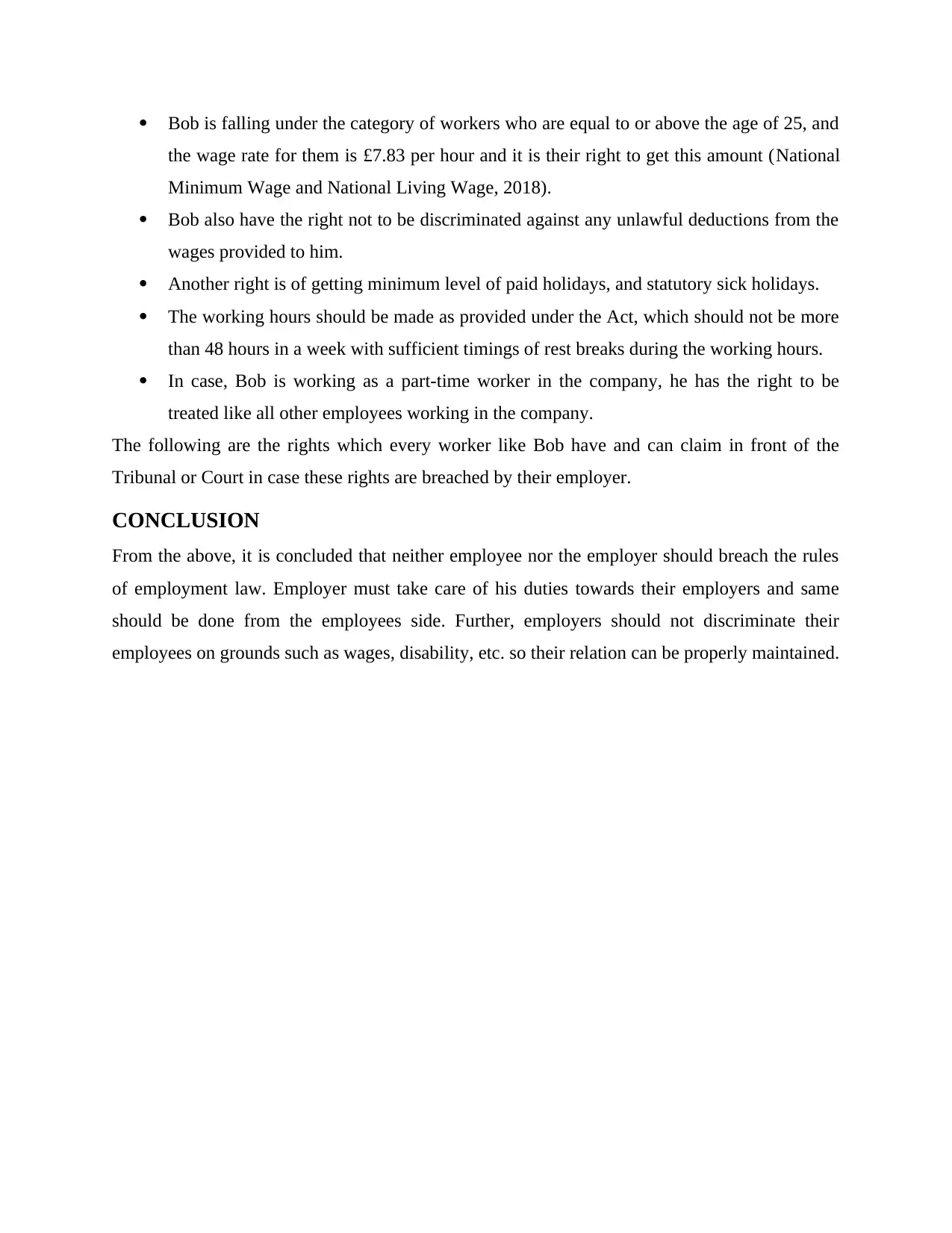
Bob is falling under the category of workers who are equal to or above the age of 25, and
the wage rate for them is £7.83 per hour and it is their right to get this amount (National
Minimum Wage and National Living Wage, 2018).
Bob also have the right not to be discriminated against any unlawful deductions from the
wages provided to him.
Another right is of getting minimum level of paid holidays, and statutory sick holidays.
The working hours should be made as provided under the Act, which should not be more
than 48 hours in a week with sufficient timings of rest breaks during the working hours.
In case, Bob is working as a part-time worker in the company, he has the right to be
treated like all other employees working in the company.
The following are the rights which every worker like Bob have and can claim in front of the
Tribunal or Court in case these rights are breached by their employer.
CONCLUSION
From the above, it is concluded that neither employee nor the employer should breach the rules
of employment law. Employer must take care of his duties towards their employers and same
should be done from the employees side. Further, employers should not discriminate their
employees on grounds such as wages, disability, etc. so their relation can be properly maintained.
the wage rate for them is £7.83 per hour and it is their right to get this amount (National
Minimum Wage and National Living Wage, 2018).
Bob also have the right not to be discriminated against any unlawful deductions from the
wages provided to him.
Another right is of getting minimum level of paid holidays, and statutory sick holidays.
The working hours should be made as provided under the Act, which should not be more
than 48 hours in a week with sufficient timings of rest breaks during the working hours.
In case, Bob is working as a part-time worker in the company, he has the right to be
treated like all other employees working in the company.
The following are the rights which every worker like Bob have and can claim in front of the
Tribunal or Court in case these rights are breached by their employer.
CONCLUSION
From the above, it is concluded that neither employee nor the employer should breach the rules
of employment law. Employer must take care of his duties towards their employers and same
should be done from the employees side. Further, employers should not discriminate their
employees on grounds such as wages, disability, etc. so their relation can be properly maintained.
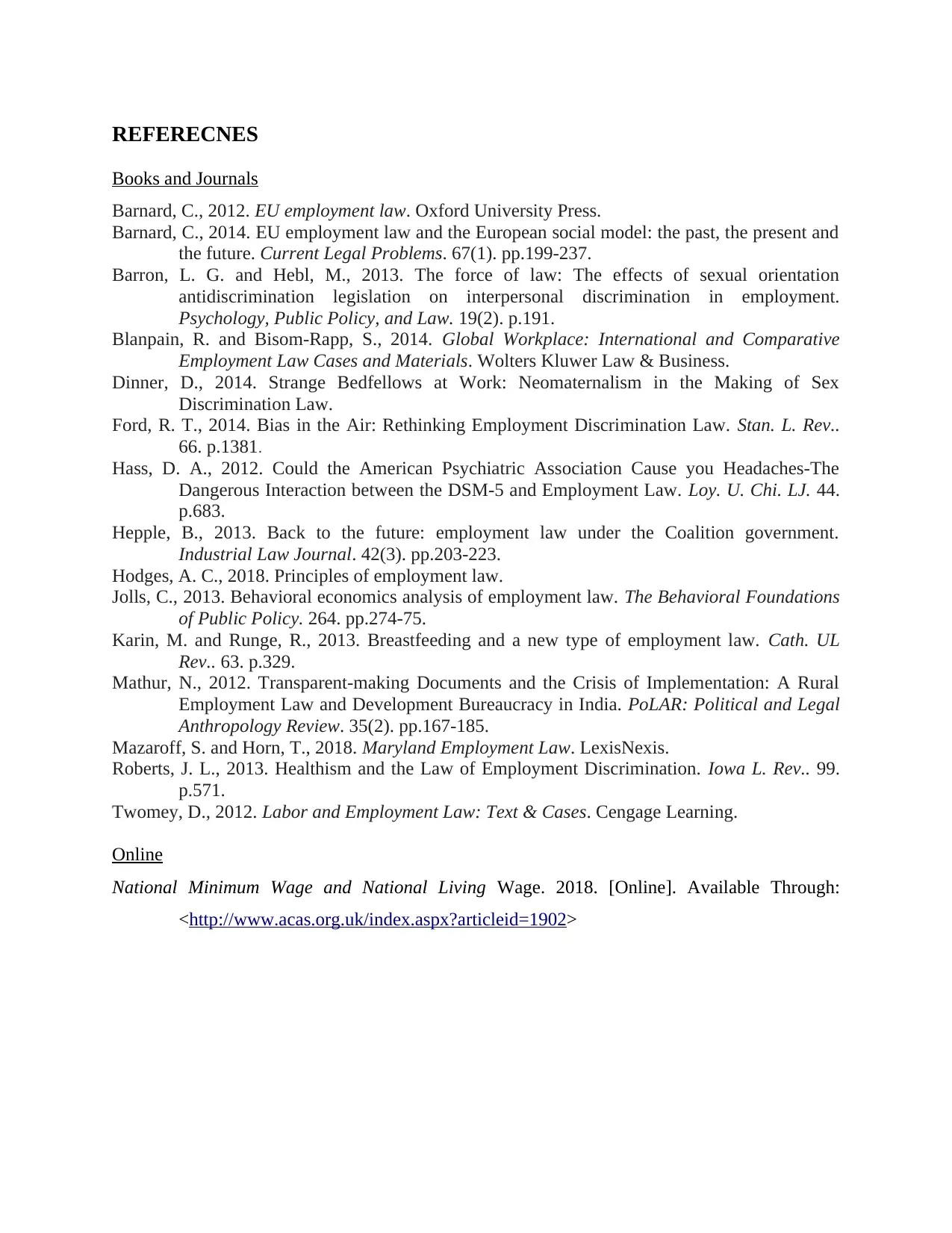
REFERECNES
Books and Journals
Barnard, C., 2012. EU employment law. Oxford University Press.
Barnard, C., 2014. EU employment law and the European social model: the past, the present and
the future. Current Legal Problems. 67(1). pp.199-237.
Barron, L. G. and Hebl, M., 2013. The force of law: The effects of sexual orientation
antidiscrimination legislation on interpersonal discrimination in employment.
Psychology, Public Policy, and Law. 19(2). p.191.
Blanpain, R. and Bisom-Rapp, S., 2014. Global Workplace: International and Comparative
Employment Law Cases and Materials. Wolters Kluwer Law & Business.
Dinner, D., 2014. Strange Bedfellows at Work: Neomaternalism in the Making of Sex
Discrimination Law.
Ford, R. T., 2014. Bias in the Air: Rethinking Employment Discrimination Law. Stan. L. Rev..
66. p.1381.
Hass, D. A., 2012. Could the American Psychiatric Association Cause you Headaches-The
Dangerous Interaction between the DSM-5 and Employment Law. Loy. U. Chi. LJ. 44.
p.683.
Hepple, B., 2013. Back to the future: employment law under the Coalition government.
Industrial Law Journal. 42(3). pp.203-223.
Hodges, A. C., 2018. Principles of employment law.
Jolls, C., 2013. Behavioral economics analysis of employment law. The Behavioral Foundations
of Public Policy. 264. pp.274-75.
Karin, M. and Runge, R., 2013. Breastfeeding and a new type of employment law. Cath. UL
Rev.. 63. p.329.
Mathur, N., 2012. Transparent‐making Documents and the Crisis of Implementation: A Rural
Employment Law and Development Bureaucracy in India. PoLAR: Political and Legal
Anthropology Review. 35(2). pp.167-185.
Mazaroff, S. and Horn, T., 2018. Maryland Employment Law. LexisNexis.
Roberts, J. L., 2013. Healthism and the Law of Employment Discrimination. Iowa L. Rev.. 99.
p.571.
Twomey, D., 2012. Labor and Employment Law: Text & Cases. Cengage Learning.
Online
National Minimum Wage and National Living Wage. 2018. [Online]. Available Through:
<http://www.acas.org.uk/index.aspx?articleid=1902>
Books and Journals
Barnard, C., 2012. EU employment law. Oxford University Press.
Barnard, C., 2014. EU employment law and the European social model: the past, the present and
the future. Current Legal Problems. 67(1). pp.199-237.
Barron, L. G. and Hebl, M., 2013. The force of law: The effects of sexual orientation
antidiscrimination legislation on interpersonal discrimination in employment.
Psychology, Public Policy, and Law. 19(2). p.191.
Blanpain, R. and Bisom-Rapp, S., 2014. Global Workplace: International and Comparative
Employment Law Cases and Materials. Wolters Kluwer Law & Business.
Dinner, D., 2014. Strange Bedfellows at Work: Neomaternalism in the Making of Sex
Discrimination Law.
Ford, R. T., 2014. Bias in the Air: Rethinking Employment Discrimination Law. Stan. L. Rev..
66. p.1381.
Hass, D. A., 2012. Could the American Psychiatric Association Cause you Headaches-The
Dangerous Interaction between the DSM-5 and Employment Law. Loy. U. Chi. LJ. 44.
p.683.
Hepple, B., 2013. Back to the future: employment law under the Coalition government.
Industrial Law Journal. 42(3). pp.203-223.
Hodges, A. C., 2018. Principles of employment law.
Jolls, C., 2013. Behavioral economics analysis of employment law. The Behavioral Foundations
of Public Policy. 264. pp.274-75.
Karin, M. and Runge, R., 2013. Breastfeeding and a new type of employment law. Cath. UL
Rev.. 63. p.329.
Mathur, N., 2012. Transparent‐making Documents and the Crisis of Implementation: A Rural
Employment Law and Development Bureaucracy in India. PoLAR: Political and Legal
Anthropology Review. 35(2). pp.167-185.
Mazaroff, S. and Horn, T., 2018. Maryland Employment Law. LexisNexis.
Roberts, J. L., 2013. Healthism and the Law of Employment Discrimination. Iowa L. Rev.. 99.
p.571.
Twomey, D., 2012. Labor and Employment Law: Text & Cases. Cengage Learning.
Online
National Minimum Wage and National Living Wage. 2018. [Online]. Available Through:
<http://www.acas.org.uk/index.aspx?articleid=1902>
1 out of 12
Related Documents
Your All-in-One AI-Powered Toolkit for Academic Success.
+13062052269
info@desklib.com
Available 24*7 on WhatsApp / Email
![[object Object]](/_next/static/media/star-bottom.7253800d.svg)
Unlock your academic potential
© 2024 | Zucol Services PVT LTD | All rights reserved.





